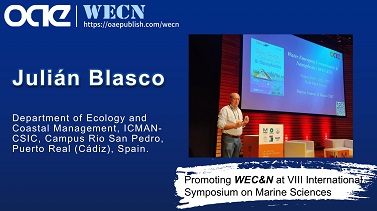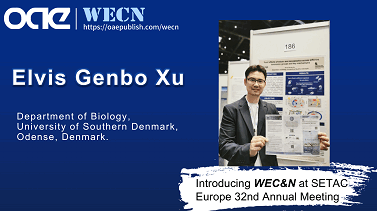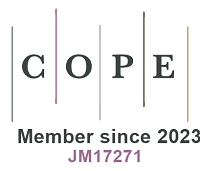The First Editorial Board Meeting of Water Emerging Contaminants & Nanoplastics was Successfully Held Online
The first Editorial Board meeting of Water Emerging Contaminants & Nanoplastics was successfully held online on March 29, 2022. The conference summarized the progress of the three months of the establishment of the journal and made prospects for future development. Professor Antonio Ginebreda, the Editor-in-Chief, hosted the meeting. 28 Editorial Board members from different countries attended the meeting.
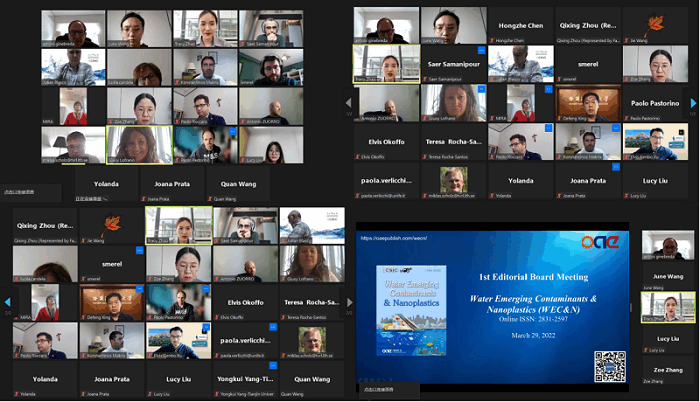
At the beginning of the meeting, Prof. Ginebreda gratefully thanked all members for attending this meeting and for working together with this newly launched journal with great passion. Prof. Ginebreda described the aims covered in Water Emerging Contaminants & Nanoplastics. The following progress in the last three months was shared during this meeting:
- Publication and Data
- Reader Distribution
- Editorial Board Team
- Acknowledgments
- Social Media and External Collaborations
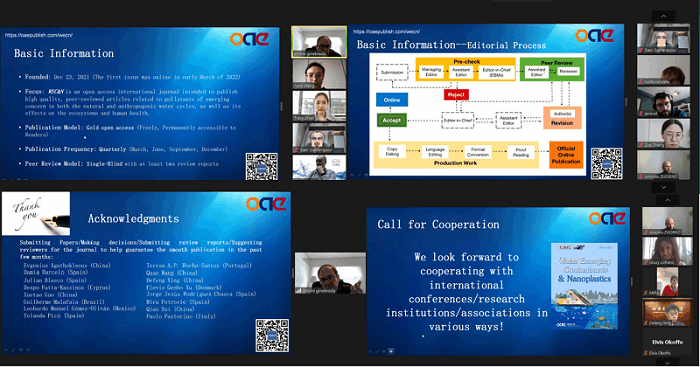
The Development Plan for the next two years was also shared during the meeting:
- Publication and Citation Plan
- Three Year Plan in Database Application
- To-do List for In-house Editors
- Supports from Editorial Board members
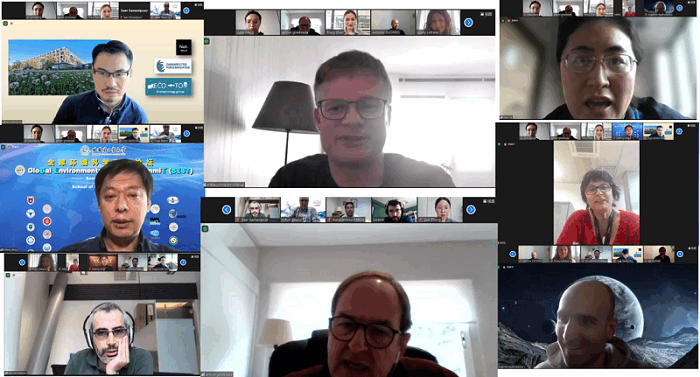
The Editorial Office of Water Emerging Contaminants & Nanoplastics would like to thank all Editorial Board members for taking time out of their busy schedules to attend this meeting and bringing their great ideas to the journal.
We are fully confident that all researchers will find a refreshing experience in reading this journal, and we would greatly and sincerely wish to publish more significant papers for readers in this field.
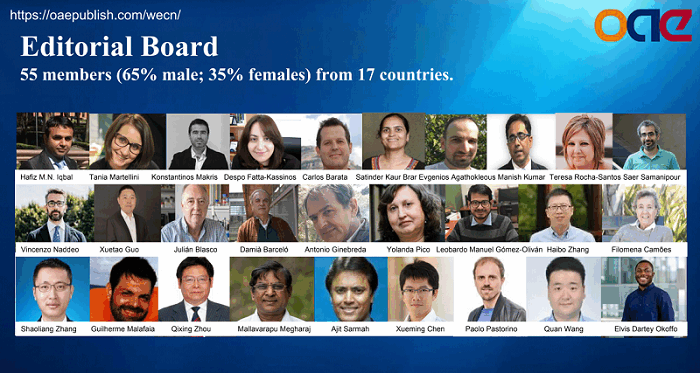
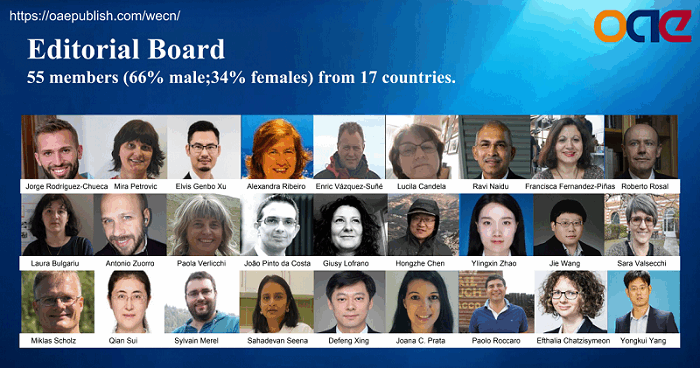
Thank you again for the attendance and support from the following members:
Attendee list (The list is in alphabetical order)
Editorial Board member:
Evgenios Agathokleous, Department of Ecology, School of Applied Meteorology, Nanjing University of Information Science & Technology, Nanjing, Jiangsu, China.
Julián Blasco, Department of Ecology and Coastal Management, ICMAN-CSIC, Campus Rio San Pedro, Puerto Real (Cádiz), Spain.
Lucila Candela, IMDEA Water Institute, Alcala de Henares, Spain.
Hongzhe Chen, Key Laboratory of Global Change and Marine-Atmospheric Chemistry (GCMAC), Third Institute of Oceanography, Xiamen, Fujian, China.
Giusy Lofrano, Centro Servizi Metereologici e Tecnologici Avanzati (CeSMA), University of Naples Federico II, Naples, Italy.
Konstantinos C. Makris, Water and Health Laboratory, Cyprus International Institute for Environmental and Public Health, School of Health Sciences, Cyprus University of Technology, Limassol, Cyprus.
Sylvain Merel, INRAE-Aquatic Chemistry Laboratory, Villeurbanne, France.
Elvis Okoffo, Queensland Alliance for Environmental Health Sciences (QAEHS), The University of Queensland, Brisbane, Queensland, Australia.
Paolo Pastorino, Aquatic Biology Laboratory of the Istituto Zooprofilattico Sperimentale del Piemonte, Liguria and Valle d’Aosta (IZS PLV), Turin, Italy.
Mira Petrovic, Catalan Institute for Water Research (ICRA), Girona, Spain; Catalan Institution for Research and Advanced Studies (ICREA), Barcelona, Spain.
Yolanda Picó, Environmental and Food Safety Research Group (SAMA-UV), The Desertification Research Centre (CIDE), University of Valencia, Valencia, Spain.
Joana Correia Prata, Centre for Environmental and Marine Studies (CESAM) & Department of Chemistry, University of Aveiro, Aveiro, Portugal.
Alexandra B. Ribeiro, Department of Environmental Sciences and Engineering, NOVA School of Science and Technology, NOVA University Lisbon, Lisbon, Portugal.
Paolo Roccaro, Department of Civil Engineering and Architecture, University of Catania, Catania, Italy.
Teresa Rocha-Santos, Department of Chemistry & Centre for Environmental and Marine Studies (CESAM), University of Aveiro, Aveiro, Portugal.
Saer Samanipour, Van't Hoff Institute for Molecular Sciences, University of Amsterdam, Amsterdam, Netherlands.
Ajit Sarmah, Civil and Environmental Engineering, Faculty of Engineering, The University of Auckland, Auckland, New Zealand.
Miklas Scholz, Department of Building and Environmental Technology, Faculty of Engineering, Lunds Universitet, Lund, Sweden.
Qian Sui, Department of Environmental Engineering, East China University of Science & Technology, Shanghai, China.
Paola Verlicchi, Department of Engineering, University of Ferrara, Ferrara, Italy.
Quan Wang, College of Natural Resources and Environment, Northwest Agriculture and Forestry University, Yangling, Shaanxi, China.
Jie Wang, Department of Environmental Science, China Agricultural University, Beijing, China.
Defeng Xing, State Key Laboratory of Urban Resource and Environment, School of Environment, Harbin Institute of Technology, Harbin, Heilongjiang, China.
Elvis Genbo Xu, Department of Biology, University of Southern Denmark, Odense, Denmark.
Yongkui Yang, Department of Environmental Science and Engineering, Tianjin University, Tianjin, China.
Yingxin Zhao, School of Environmental Science and Engineering, Tianjin University, Tianjin, China.
Qixing Zhou, College of Environmental Science and Engineering, Nankai University, Tianjin, China.
Antonio Zuorro, Department of Chemical Engineering, Materials and Environment, Sapienza University of Rome, Rome, Italy.
Editor-in-Chief:
Antonio Ginebreda, Department of Environmental Chemistry, Institute of Environmental Assessment and Water Research (IDAEA), Spanish Council for Scientific Research (CSIC), Barcelona, Spain.
Editorial Office:
Haidi Ding, Journal Manager
Zoe Zhang, Assistant Editor
June Wang, Assistant Editor
Lucy Liu, Media Editor
Respectfully Submitted by the Editorial Office
Water Emerging Contaminants & Nanoplastics



